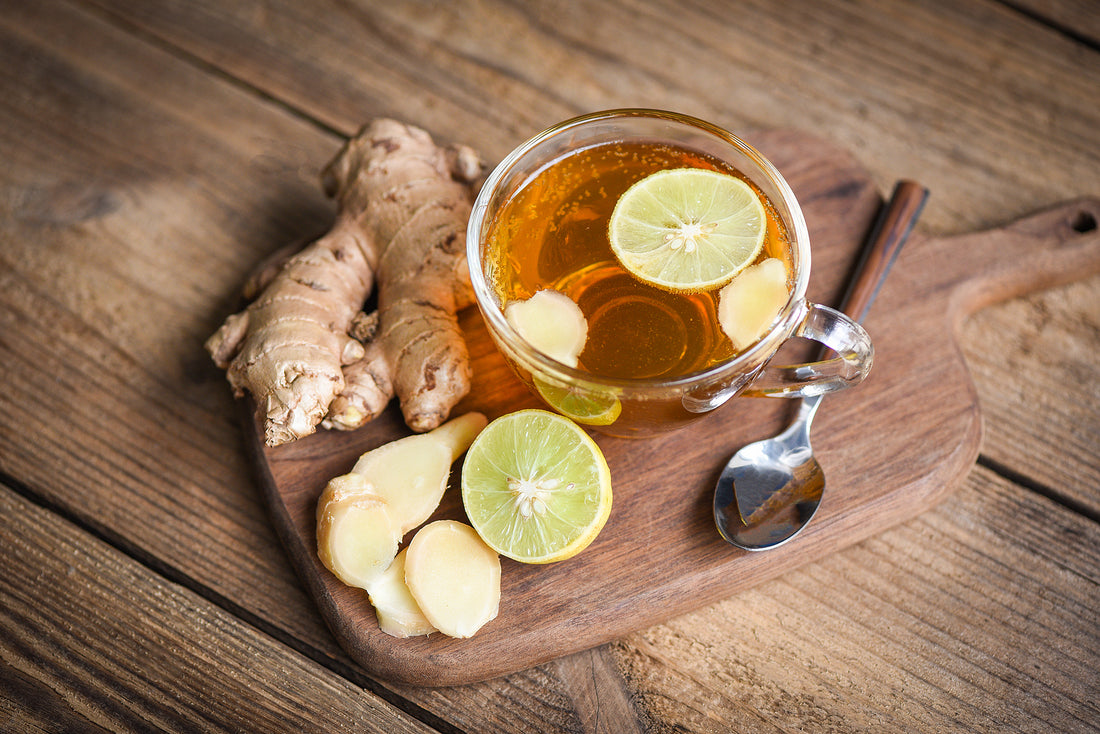If you’re a fan of sushi at all, you’ve probably noticed that many dishes will come with a scoop of green wasabi paste, along with a few pieces of pickled ginger slices.
According to tradition (10), the pickled ginger is known to cleanse the palate. This allows you to fully appreciate each part of the sushi, from the fish to the complimentary additions. But that’s not the only thing it can do.
Ginger is a plant that originates from China, but can be found in India and other parts of the world, including Hawaii. You can even grow it yourself. With narrow leaves and a thin stem, you wouldn’t think its roots look the way they do.
Thick and club-like, the Zingiber officinale (ginger) root is harvested and used fresh or dried for both culinary and medicinal purposes.
Benefits
Medicinally, ginger has been used for thousands of years. What are some of the ways it can enhance your health?
- Weight loss: If you’re overweight and struggle to drop those stubborn pounds, give ginger a try. One study (2) involving 40 middle aged women took 2 grams of ginger a day for 3 months. At the end of the study, their BMI (body mass index) was a great deal lower ✝✝.
- Arthritis: The wearing-away of joint tissue can cause pain and stiffness. Ginger can help relieve pain and disability, as one study (4) points out ✝✝.
- Fights Infections: Similar to garlic, ginger contains germ fighting compounds that can help keep you healthy. This is especially true in regards to respiratory (11) health ✝✝.
- Blood sugars: If you fall into the pre-diabetic or diabetic spectrum, ginger can help. Some studies suggest it has been shown to help reduce (5) blood sugar levels when taken consistently ✝✝.
- Heart disease: Due to the anti-blood clotting properties, ginger can help prevent or reduce the severity of heart disease (9) on a number of levels ✝✝.
- GI issues: Bouts of stomach issues are common. Ginger has properties that can help relieve symptoms of nausea, especially caused by morning sickness or chemotherapy. A study (3) showed that it had similar effects as the medication metoclopramide ✝✝.
- Antioxidants: Ginger is packed with phenolic compounds called gingerols. They’re considered free radical fighters that counteract the effects of oxidative stress (7)✝✝. Consuming ginger regularly could help in the quest for reduced inflammation in your body✝✝.
- Cholesterol: High levels of LDL cholesterol is a recipe for trouble, especially where your heart is concerned. One study (6) showed that participants that took 5 grams of ginger every day for 12 weeks had lower levels of cholesterol over those who didn’t ✝✝.
- Supports brain function: Memory, cognitive function, and mental clarity are all things that can go downhill with age, stress, and poor nutrition. One study (1) showed that women who took a 400mg -800mg dose of ginger every day for 2 months had increased memory and reaction times. For those diagnosed with dementia or Alzheimer’s disease, this may be of great value ✝✝.
Risks
In most circumstances, taking ginger poses little risk. Taking too much can cause stomach upset, nausea or diarrhea.
While ginger does seem to help with morning sickness, it also has a history of associated vaginal bleeding (8). If you’re pregnant, check with your OBGYN.
Also, if you’re taking certain medication for heart or blood conditions, interactions may occur. Speak with your doctor before adding ginger to your regimen.
How to Take Ginger
Adding ginger to your life can be done in lots of ways. You can:
- Sprinkle it in foods, drinks, teas or smoothies
- Take it by mouth with either powders, tablets or capsules.
- Apply a topical gel, ointment, or create anti-aging face masks
- Inhale as an aromatherapy essential oil
Finding what works for you can increase your chances of including ginger into your daily life.
Note: although rare, make sure you’re not allergic to topical ginger gels or paste. If you develop itching, redness or a rash, stop using right away.
Wrap Up
Ginger is an incredible root that has alleviated many health concerns for millennia. The dried version of this herb can be taken orally to help with blood sugars, nausea, cholesterol, and joint pain. The fresh version can be made into a tea. There are many who claim you can make face masks or other beauty products to look younger and more vibrant. It can also be inhaled as an essential oil to help with nausea.
And while it’s a wonderful spice to have, talk with your doctor if you’re pregnant, breastfeeding, on certain heart or blood medications, or have other health concerns.
Have you tried ginger yet? If not, check out your local health store or trusted farmer’s market. It could very well change your life!
References
(1) https://www.ncbi.nlm.nih.gov/pmc/articles/PMC3253463/
(2) https://link.springer.com/article/10.1007/s00394-015-1027-6
(3) https://pubmed.ncbi.nlm.nih.gov/22545357/
(4) https://www.sciencedirect.com/science/article/pii/S106345841401276X
(5) https://www.ncbi.nlm.nih.gov/pmc/articles/PMC4277626/
(6) https://www.ncbi.nlm.nih.gov/pmc/articles/PMC4277626/
(7) https://pubmed.ncbi.nlm.nih.gov/25230520/
(8) https://onlinelibrary.wiley.com/doi/10.1002/ptr.5235
(9) https://pubmed.ncbi.nlm.nih.gov/18037515/
(10) https://www.thekitchn.com/why-is-pickled-ginger-served-with-sushi-228461
(11) https://pubmed.ncbi.nlm.nih.gov/23123794/
✝✝This noted statement is based on independent research and is not necessarily the opinion of the author
